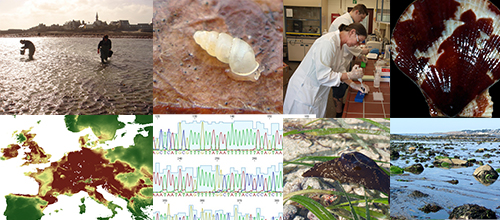Phylogeny and Systematics of Animals

"They are not only really interesting to study, but also beautiful", professor Annette Klussmann-Kolb explains with enthusiasm. The subject of her research – snails from the Heterobranchia group – are characterised by their unusual form, colour and origin. Klussmann-Kolb analyses the morphology and anatomy of these snails and compares their gene sequences to those of other molluscs. The data she gathers from these animals during her fieldwork and from fossil reports help her to reconstruct how the species evolved (phylogeny). "The Heterobranchia that we study have been present since the Palaeozoic, and they have diversified to over 30,000 species that developed under totally different living conditions. We attempt to determine which changes in key features may have contributed to the initiation of the radiation of discrete evolutionary lineages", Klussmann-Kolb explains.
Morphologically problematic species that are hard to distinguish (cryptic species) are determined by genetic analytical methods using deoxyribonucleic acid (DNA) bar-coding. The modern molecular clock approach applied in this area of research can reveal the date of the diversifications in the animals' phylogenetic tree – a method that Charles Darwin could never have dreamed of having at his disposal. Using these findings Klussmann-Kolb and her research group make hypotheses about the connection between climate change and the process of diversification in snails and other molluscs. As a project area leader and project group leader, Klussmann-Kolb works closely together with her colleagues at the Biodiversity and Climate Research Centre (BiKF) searching for answers to these new types of questions. She places great emphasis on students combining theory and practice, and has been instrumental in redesigning the compulsory species identification course, which no longer involves looking only at the characteristics of individual animals but instead favours an evolutionary understanding of diversity that is developed by comparing different animals. Klussmann-Kolb also keenly encourages her students to go on excursions, attend meetings and take part in mentoring programmes. In 2008 the Presidium of the Goethe University awarded her the 1822-Stiftung der Frankfurter Sparkasse Universitätspreis for excellence in teaching.
Brief Biography

Subsequent to obtaining her degree in Biology at Bielefeld University, Annette Klussmann-Kolb completed her doctorate on the "Funktionsmorphologie des Genitaltraktes von marinen Schnecken (Functional Morphology of the Genital Tract of Marine Snails)". After a short period on parental leave, she spent nine months at James Cook University in Townsville, Australia, studying the phylogeny of seahares (marine Opisthobranchia) on a DFGfunded research scholarship. She then went to Dalhousie University in Halifax, Canada for a short period of research. In late 2002 Klussmann-Kolb was appointed assistant professor at the Goethe University Frankfurt. There she established the Department of Animal Phylogeny and Systematics and was appointed professor in this department in 2009. Her work is also part of the Biodiversity and Climate Research Centre (BiKF) of the Senckenberg Nature Research Society and of the Goethe University.
Contact:
Prof. Dr. Annette Klussmann-Kolb
Institute of Ecology,
Evolution and Diversity
Max-von-Laue-Str. 13
(Biologicum, Flügel D)
60438 Frankfurt am Main
Germany
Telephone: +49 (0)69 798 42210
E-Mail: Klussmann-Kolb@bio.uni-frankfurt.de
www.bio.uni-frankfurt.de
- Studying at Goethe University
- International applicants
- Faculties
- Overview of study programmes
- Programme for refugees
- GRADE
- Goethe Business School (continuing education)
- Research at Goethe University
- Scientific news
- Goethe Welcome Center (for international researchers)
- Collaborative research projects
- Individual research
- Visiting fellowships
- Endowed chairs
- About the University
- News-in-brief
- University administration
- Campus locations
- Campus life
- University archives (German)
- Rhine-Main-Universities




